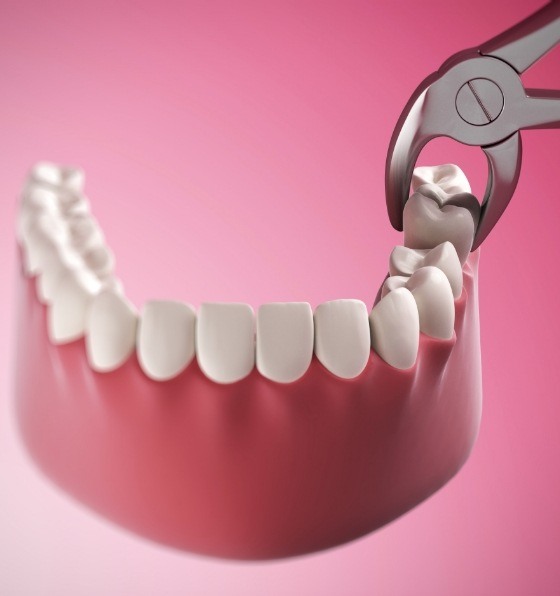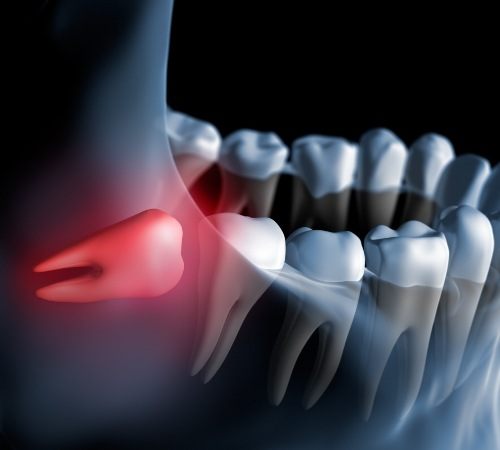Tooth Extractions – Lincoln, NE
We Can Remove Problematic Teeth
Tooth extractions in Lincoln, NE are very useful and can help prevent a myriad of problems. Ideally, we’d be able to save every one of your teeth from damage or decay, but sometimes that is simply not possible when a problem is severe. In these cases, a tooth extraction may be the most viable treatment. It is often used as a last resort or an essential preventive measure. Your dentist in Lincoln, NE at Pioneer Greens Dentistry will be able to make you as comfortable as possible when performing your tooth extraction.
Why Choose Pioneer Greens Dentistry for Tooth Extractions?
- ·Patient Comfort is Priority #1
- ·Multiple Types of Sedation Available
- ·Able to Replace Missing Teeth Quickly
Common Reasons for Tooth Extractions

A tooth often needs to be extracted because it has become too badly damaged from trauma or decay. This means that there is not enough viable dental structure to support a restoration like a dental crown or filling. Some other common reasons are:
- Crowding: There are many instances where all of a person’s teeth may not be able to fit in their mouth. This crowding can cause the teeth to become crooked or prevent them from erupting at all. Crowded teeth are harder to clean and can be impossible to straighten with treatments like Invisalign if they do not have room to move. An extraction can help create this space.
- Infection: If tooth decay has reached the innermost layer of the tooth (the dental pulp) and cannot be treated effectively by root canal therapy, an extraction may be the best way to prevent the infection from spreading.
- Risk of Infection: A compromised immune system that stems from preexisting medical conditions may make a person particularly vulnerable to infection. A tooth extraction may be the best way to prevent an infection from happening.
- Impaction: This mostly refers to the wisdom teeth. Often, they do not have enough room to erupt into the mouth, so they can become stuck and start moving your other teeth. This can lead to both crowding and an infection, and the best way to alleviate it is to have them extracted. We will always examine your wisdom teeth during your normal check-up and will let you know the best time to have them removed.
What To Expect When Getting a Tooth Extracted

Most people’s initial thought about tooth extraction is that it is going to hurt. This is not the case with modern dentistry. Before every tooth extraction, you will be numbed using local anesthetic so that you will not experience any physical discomfort. If you are having your wisdom teeth removed, this involves an incision on your gums, so you will be given a strong general anesthetic to assure that you will practically sleep through the entire procedure.
Dr. Justin Shirk will extract the tooth by using forceps to gently grasp it and rock it back and forth. This gradually loosens the tooth so that it is easier to remove and is a much milder experience for the patient than simply pulling. A tooth may need to be extracted in pieces if it is particularly difficult to remove.
Afterward, a gauze pad will be packed into the empty socket, and you’ll be asked to bite down. This will help manage the bleeding. If you have had your wisdom teeth extracted, you will have self-dissolving stitches placed in your gums to close the incisions.
Tooth Extraction Aftercare

Following a tooth extraction, you may experience some slight soreness. You can take a few simple steps to minimize your discomfort, reduce the risk of infection, and help speed up your recovery:
- Take medication as prescribed.
- Change your gauze as often as your dentist has recommended. Gently bite down to reduce the bleeding and help your blood clot.
- Use a cold compress to help reduce any swelling.
- Limit physical activity on the day of and after the extraction. This period of rest may be longer for wisdom teeth extractions, so be sure to follow the directions from your dentist.
- Do not drink from a straw for at least 24 hours.
- Eat softer foods such as pudding, yogurt, or applesauce. You will gradually be able to add solid food back in as you heal.
- Prop your head up when lying down, as being flat may prolong bleeding
- Continue to brush and floss your teeth while avoiding the extraction site.
The healing period usually takes about one to two weeks. At this point, you can talk to your dentist in Lincoln, NE about replacing your missing tooth with a dental implant, fixed bridge, or denture.
Understanding the Cost of Tooth Extractions

Before moving forward with any treatment, you should be aware of the cost that comes along with it. This is certainly true of tooth extractions in Lincoln! After we have examined you and have created a unique treatment plan, we can then put together an estimate for your extraction procedure. At that time, we can answer any questions you may have about the cost and go through payment options with you in greater detail.
Factors That Can Affect Tooth Extraction Cost

When calculating the cost of your extraction procedure, we consider many things, namely how many teeth are being removed, whether you will receive sedation and what kind, and whether surgical removal is necessary. Logically, extracting multiple teeth will cost more than just one. Sedation incurs additional cost, but your comfort during the procedure is extremely important. Finally, teeth that must be surgically removed will require more time and skill and therefore a higher cost. Plus, if you need to replace the missing tooth, there will be a separate cost for that as well.
Does Dental Insurance Cover Tooth Extractions?

With so many different insurance companies and plans available, they are bound to be unique in specific coverage. However, in general, insurance policies usually cover part of the cost of tooth extraction. Our team would be happy to take the time to understand your plan and explain your benefits to you, if necessary. We will do our best to help you take full advantage of your benefits and reduce your out-of-pocket costs.
How to Make Tooth Extractions Affordable

Whether you have insurance benefits or not, we at Pioneer Greens Dentistry do not want you to worry about how you are going to afford treatment. When it comes to tooth extraction, you will have enough on your mind as it is! That’s why we can help you apply for low-interest financing through CareCredit. Through it, you can make smaller monthly payments instead of one large one that could be outside your budget.
Tooth Extraction FAQs
Compared to other dental treatments, extraction is one of the most invasive and permanent. As a result, you should make sure you understand it completely before proceeding. If you would like to know more about extractions, how they work, and how they can help you, please give us a call today. We are always available to answer any of your questions, but we have taken the opportunity here to respond to some of the more common questions below.
How long does tooth extraction take?
Extraction time can vary from case to case and depends on several factors, such as the number of teeth being extracted. The location of the tooth, whether in the front or back of the mouth, plays a role as well in how long it takes to remove it. The back teeth tend to take longer because they often have multiple roots, which require more time to loosen. Also, removing a tooth that has erupted usually entails less time and effort than one that is still underneath the gums, like a wisdom tooth. If you are concerned about the duration of your procedure, we can give you a more accurate idea in person.
Will I need to have someone drive me home after my tooth extraction?
When you get a tooth extracted, you should plan to have a family member or friend take you from our office to your home. Depending on your case, you may be heavily sedated and unable to drive by yourself. Even if you are only under nitrous oxide sedation, we recommend getting a ride. Please make arrangements in advance so that you can focus on getting better and recovering from your extraction rather than worrying how you will get home.
How many days should I take off work?
Usually, we encourage our extraction patients to rest for at least one full day following the procedure. During this time, you should rest with your head inclined to better control blood flow. Those who have less active office jobs can return to work after this period. Be careful if you have a more active, strenuous vocation because you could disrupt the healing process at the vulnerable site. If you are not sure how much time you’ll need, you can ask Dr. Justin Shirk for his expert opinion.
What are my tooth replacement options?
In some situations, such as wisdom tooth extraction, replacement is not necessary. However, in many others, the removed tooth does need to be replaced. For a single extracted tooth, your options include a dental implant, which accounts for the entire structure of the missing tooth, or a dental bridge. We can discuss these options in greater detail, going through all the advantages and disadvantages of each so that you reach the best decision for your smile.
I Need a Checkup & Cleaning I Need a Dentist for My Child I am Worried About Gum Disease I Have a Cavity or Broken Tooth I am Missing One or More Teeth I Want to Enhance My Smile I Want a Straighter Smile I am Scared of the Dentist I'm Having Trouble Sleeping I Have a Dental Emergency View Our Services
